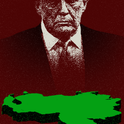As an intelligence historian working in the Applied History Project at Harvard Kennedy’s School of Government, I study ways that history can inform present government intelligence and national security policies. One of the issues my colleagues and I are grappling with is the extent to which history remains relevant when something happens so dramatic, and damaging, that it fundamentally breaks with the past. I would look at this the other way round: during world-shaking crises, it is more important than ever to look to history, as past similarities and differences can help us better understand them. Events last week in Donald Trump’s White House have tested this theory to the extreme: they are without precedent in US history.
On Tuesday last week, Trump fired his FBI director, James Comey, who was heading a counter-intelligence probe into the president’s election connections with Russia. The next day, having “terminated” Comey, and given confusing explanations for doing so, Trump held a private meeting in the Oval Office with two top-ranking Russian diplomats, the Russian foreign minister, Sergei Lavrov, and the Russian ambassador in the US, Sergei Kislyak. During this meeting, Trump is understood to have disclosed to his Russian guests highly classified “code-word” intelligence—the highest classification intelligence in the entire US government.
To make matters worse, this intelligence was derived from a US ally, reportedly Israel. Never before has a US president unilaterally disclosed to a hostile power, Russia, ultra secret intelligence derived from a US intelligence ally without permission from that country. If the reports are true, we are now in historically uncharted territory. Trump’s disclosures to the Kremlin—pundits are calling it LeakGate—pose a serious risk to US national security. America and its intelligence allies are not equipped for a leaker-in-chief as president. No wonder Lavrov and Kislak are smiling in the pictures of their Oval Office meeting.
Trump’s well-respected National Security Adviser, HR McMaster, was sent out to deny press reports that Trump leaked classified intelligence to his two Russian visitors. However, apparently working at cross-purposes, in an early morning twitter storm, Trump appeared to confirm that he disclosed “facts” on terrorism and airline safety to the Russians for “humanitarian” reasons—adding that he had an “absolute right” to do so. Whether this is true legally misses something more important: the security, intelligence, and political consequences of him doing so. If he were motivated by humanitarian reasons to share the highest possible grade US intelligence with the Kremlin, he should have done so through secure, official, liaison channels, after proper US assessment of disclosure, not in an apparently off-the-cuff way. Trump’s blabbing of intelligence to Lavrov and Kislyak may have been because he was showing off.
Trump’s carelessness with intelligence will have several consequences. First, there will be immediate security implications for the secret source of the intelligence, which related to a terrorist plot by Islamic State on airlines. Wherever this intelligence was derived from, and however it was obtained, we can assume that the US intelligence ally in question has since been scrambling to shut down its compromised collection operation. If derived from a well-placed agent in Islamic State, it is reasonable to assume his or her life is now in danger.
McMaster’s statement that Trump had not disclosed “sources and methods” to the Russians was carefully worded, but really a red-herring: it does not matter whether Trump expressly described sources and methods because adept intelligence agencies like Russia’s security service, the FSB, or its foreign service, the SVR, may be able to deduce collection methods and sources from what he said. This is important because Russia’s interests in the Middle East, particularly in Syria, Islamic State’s battleground, from where the intelligence was apparently derived, are divergent from America’s interests and the interests of its close allies. Russia supports Bashar al-Assad’s regime in Syria, and, by extension, is aligned with Iran and Hezbollah—Israel’s sworn enemies. All would be interested to know where and how an American ally like Israel is collecting intelligence.
Trump’s cavalier handling of intelligence is likely to undermine US intelligence efforts abroad, for example with agent recruitment: people with sensitive information abroad, often in dangerous places, may now think twice about passing it to US agencies like the CIA if president Trump, to whom the CIA ultimately reports, could pass it to the Kremlin. More broadly, Trump’s leaks to Russia undermine intelligence cooperation between America and its allies. US national security depends on international intelligence cooperation, as does, it is not an exaggeration to say, broader western security. Intelligence sharing between countries relies on trust that information shared will remain secret. Trump’s apparent disclosures to Russia have broken the equivalent of the Nicene Creed of intelligence work, known as the “Third Party Rule”: a recipient of intelligence from one nation cannot pass it on to a third without the originator’s agreement. It is a matter of faith among intelligence partners that this rule will not be broken.
If Trump’s America cannot be trusted to safeguard secrets, then its intelligence partners—the closest of which is Britain—will restrict, or even stop, sharing intelligence that may end up in the White House. Intelligence chiefs in in Britain, Israel, and in Washington itself, are likely to be urgently devising strategies about how to maintain intelligence sharing with America with a White House that leaks to Russia. There are no obvious practical solutions. It seems difficult to imagine, for example, London sharing intelligence with Washington accompanied by a security warning that it cannot be disclosed to the White House. Since he took office, US intelligence has reportedly been unofficially restricting intelligence to Trump because of fears about Russia. This can only go so far. London will be acutely aware that if Trump were to ask for particular intelligence, or expressly about sources and methods, then, as he is US commander-in-chief, US intelligence would be unable to withhold it. The risks are profound. We may soon witness a modification of intelligence flowing to Washington through the so-called “Five Eyes” intelligence-sharing agreement between Britain, America, Canada, Australia and New Zealand. This has been one of the most successful intelligence-cooperation agreements in history and a cornerstone of western security since the Second World War.
Trump’s disclosures to Russia will also further damage relations between the US intelligence community itself and Trump’s White House, which are already historically bad. Before taking office, Trump dismissed the unified assessment of the US intelligence community that Russia interfered in the 2016 presidential election. He compared US intelligence to the Nazis. The day after taking office, he gave a speech at CIA headquarters in Langley, in front of a wall honouring fallen CIA officers, in which he talked about his inauguration crowd size.
Trump’s leaks to the Kremlin are wrapped up in much bigger questions about his administration’s connections with Russia. With staggering irony, this week Russian President Vladimir Putin helpfully offered to release a transcript of Lavrov and Kislyak’s meeting in the Oval Office. It is unclear whether the White House will rely on Russian transcripts to support its case; given the history of Kremlin disinformation, an alarming idea. One of the Russian diplomats who visited the Oval Office, Kislyak, is understood to be a spy-handler and is at the centre of the “Kremlingate” controversy: it was thanks to undisclosed contacts with him that Trump’s attorney general, Jeff Sessions, had to recuse himself from Russian investigations and likewise Trump’s former National Security Adviser, Michael Flynn, was dismissed after an unprecedented 24 days in office.
In a previous article for this magazine, I predicted that Flynn’s downfall was likely to be the beginning, not the end, of Russian scandals for Trump. While this was accurate, it may be the scandal that ends Trump’s presidency. Trump may have obstructed justice regarding Flynn: he reportedly asked his former FBI director, Comey, to end his investigation into him. Obstruction of justice is an impeachable offence for a US president. The allegations are so serious that a special counsel, Robert Mueller, another former FBI director, has now been appointed to investigate the entire Russian affair with Trump’s presidency.
When the history of the Trump presidency comes to be written, it will surely be noted with sad irony that having repeatedly lambasted Hillary Clinton during the election campaign for mishandling classified intelligence, Trump stands accused of the same. During the campaign, Trump also threatened he would appoint a special prosecutor to investigate Clinton, and now faces a similar investigator himself.
So what does history suggest about the crisis facing Trump’s White House? Whether or not he knew it—on his own account, Trump does not read books and is ignorant of history—at the end of last week he revealed where the crisis seems to be heading: towards a Watergate-style scandal. In a tweet—inevitably—he suggested that there might be “tapes” of his conversations with his former FBI director, Comey. Not only does this add a twist to Trump’s previous unsubstantiated claims that Barack Obama “wiretapped” him, it invites obvious comparisons with Nixon’s secret recordings in the Oval Office and Watergate. Mueller’s appointment as special prosecutor to investigate Trump has hallmarks of Watergate. Democrats smell blood, discussing impeachment, and even Republican stalwarts like Senator John McCain are drawing Watergate comparisons.
Such comparisons, however, only go so far: unlike Watergate, Trump’s scandal involves an adverse foreign intelligence power. If he is heading towards a Nixon-style impeachment, he is doing so in fast-forward. Trump is only four months in to a four-year presidency. It was five years into Nixon’s presidency that a special prosecutor was appointed to investigate him. After just 14 months, Nixon was out of office.
America’s leaker-in-chief: Trump and Russia
The US president’s carelessness could end up damaging America’s relationships with its security partners
May 19, 2017

©Sipa USA/SIPA USA/PA Images











